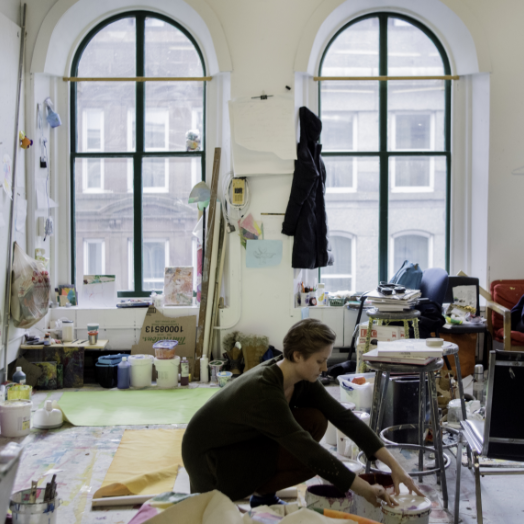Masters of Fine Arts (MFA)
The Master of Fine Arts degree (MFA) is internationally recognized as a standard qualification required to teach visual arts and craft at post-secondary educational institutions such as colleges and universities.
NSCAD University’s MFA program provides students with the opportunity to develop their work in a context of intense critical discussion. Academic research in art and craft history and other relevant subjects form an integral part of the program.
The NSCAD University MFA program recognizes and accommodates the range of diverse and innovative studio-based practices, and provides students with the opportunity to develop their work in a context of intense critical discussion across craft, fine arts and media arts disciplines.
Division: Art History and Contemporary Culture / Craft / Design / Fine Arts / Media Arts
Degree: Master of Fine Arts
Program: Master of Fine Arts (Studio)
Program Length: 20-24 months of study or 4 to 6 semesters (see Degree Requirements)
Program Starts: September 2025
Campus: Fountain Campus
Admission Deadline: January 15

The structure of the program, whether full-time or part-time, allows for either maximum focus or flexibility, whether research interests are heterogeneous and cross-disciplinary or highly focused and specialized. Pedagogy, research/creation and other integral academic courses enhance the studio focus.
Students are selected for their capability as artists and craftspersons, their critical abilities and the personal qualities and interests that might contribute to their professional success. The MFA is discipline-based or interdisciplinary, depending on research needs. Applicants normally have core training and a background in ceramics, jewellery/ metalsmithing, textiles/fashion, drawing, sound, video, digital media, film, installation, painting, performance, photography, printmaking or sculpture.
What Our Master of Fine Arts Students Can Expect
- During their first semester, all MFA students select a program advisor from among the full-or part-time NSCAD faculty to support the student throughout the duration of the program.
- MFA students may choose to take more than 60 credits required for the MFA degree. In some cases, additional or make-up courses are required as a condition of acceptance to the program. Tuition fees are set per credit; make-up and supplemental courses are taken at the student’s expense.
- The MFA degree is awarded after successful completion of full-time course work over a two-year period, or part-time course work within a period of five years or less. Other requirements include four reviews by committee, a thesis exhibition and a thesis statement.
- MFA students maintain full access to their studios and facilities throughout summer semesters, regardless of whether they are registered for summer courses.
- The MFA students organize an annual group exhibition of their work at the Anna Leonowens Gallery. This exhibition takes place each fall semester.
Featured Courses
Graduate Seminar: Technologies of Experience
Graduate Seminar: Technologies of Experience: This course will examine the role that science and technology have had on the development of art and culture during the 20th century. The epistemological transition from optical systems of representation to the contemporary arena of digital technologies will be explored through readings, writing, lectures and discussion.
Black & White & Re(a)d
All Over
Black & White & Re(a)d All Over: Colour is patented (Yves Klein International Blue), and branded (Coca-cola red), socially marked and culturally located. Yet it is fugitive, perceptually variable and essentially subjective. This seminar will explore the ways in which colour has been theorized, organized and used, particularly by artists. Students will read from contemporary writers on colour and will be encouraged to link their own use (or omission) of colour in their studio practice to ideas under discussion. A research journal, paper and presentation are required course work.
Art in Public Places
Art in Public Places: This course focuses on the development, function and production of art for and with a diverse public. Students will develop a critical awareness of the history, philosophy, theories and issues of public art relevant to program focus areas (developmental, museum, community). Strategies for public engagement are analyzed and applied through the creation of an art intervention.
Graduate Seminar: Things
This course considers the historic and contemporary discourses about the experience of things and the significant role that our relationship to things retains in the production of objects and subjects in visual and material culture. What are things, what do they do and why do they inspire creative and critical attention? Participants in the seminar will explore the subject of things through readings, writing and presentations.
Please visit the Academic Calendar for a description of all courses available during your studies at NSCAD University.
